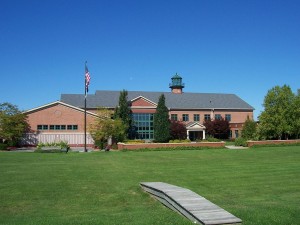An Invocation for Everyone: What the Secular Invocation in Greece, N.Y., Means for Humanists
 Greece, NY town hall. Photo by Daniel Penfield via Wikimedia Commons.
Greece, NY town hall. Photo by Daniel Penfield via Wikimedia Commons. With a population of about 96,000, the town of Greece, New York, is hardly the sort of place one would expect to make national news. But this suburb outside of Rochester did in May, when the U.S. Supreme Court ruled that the town’s practice of offering sectarian, primarily Christian prayers before legislative sessions was constitutional. Naturally, the humanist community was shocked that this disregard of separation of church and state was permitted by the Supreme Court. However, the majority decision in the case did state that local governments had to be inclusive in their prayer practices.
Greece, New York, again made national news last night when that inclusivity was tested. Dan Courtney, a secular invocation speaker endorsed by the American Humanist Association’s Humanist Society, gave the first-ever secular invocation offered before the Town of Greece Board meeting.
Courtney began by quoting the Declaration of Independence: “Governments are instituted among Men, deriving their just powers from the consent of the governed.” In his invocation, he then went on to apply this principle to our present-day society, declaring that our leaders should seek guidance from all of their citizens, not a higher power, as well as through the application of reason:
That this premise still endures testifies to its truth, and we can say with confidence that it is in seeking the counsel of our conscience that we find the beginning of wisdom. It is in the exercise of our duty as citizens that we find the beginning of knowledge. We, as citizens, the beginning and the end, the alpha and the omega of our destiny, are not, as the great philosopher Immanuel Kant warned, mere means to the ends of another, but we are ends in ourselves. (Watch the invocation and read the full transcript here.)
Rather than be divisive, which sectarian prayers before public meetings in our pluralistic society all too often are, Courtney chose to focus on inclusion. By appealing to our shared human values, instead of a deity, he solemnized the town’s meeting by reminding the Board and the audience of what brings us together. At a press conference immediately following the invocation, Courtney and the other speakers present emphasized the importance of tolerance over dissonance. David Niose, legal director of the American Humanist Association’s Appignani Humanist Legal Center, who spoke at the press conference, highlighted this need for greater acceptance of humanist and atheist viewpoints when he discussed how AHA will continue to “ensure secular Americans have a place at the table” in giving invocations before public meetings.
While humanists might not be happy with the Supreme Court’s decision in Town of Greece v. Galloway, offering invocations is a way to not only increase the visibility of the humanist community but also a means of spreading our own positive message. Unlike many sectarian prayers, which can leave out those of different religious faiths as well as those with no religion at all, secular invocations affirm values that all of us share, such as acceptance, respect, and dignity.
Dan Courtney isn’t alone in offering a secular invocation before a public meeting. David Williamson of the AHA-affiliated Central Florida Freethought Community has been mobilizing atheists and humanists in the Orlando area to make their voices heard in their own communities by offering secular invocations. Already, dozens of nontheists have scheduled invocations in their towns.
If you want to stand up for the humanist community and make sure that your local legislature is inclusive of everyone, religious and nonreligious alike, then the Humanist Society’s website has some excellent resources. The Humanist Society is also looking to increase its number of secular invocation speakers. Applying to be a secular invocation speaker is one way that you can share the positive message of humanism while taking a stand for separation of church and state.
